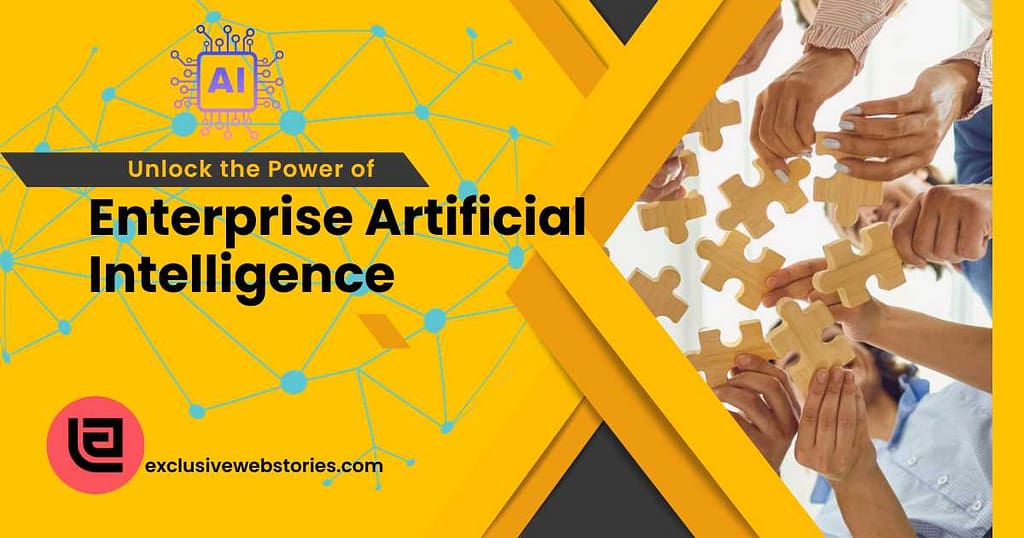Exclusive Web Stories)– Enterprise Artificial Intelligence
- There must be more than just keeping up with the latest trends in today’s fast-paced corporate market.
- It requires creative problem-solving, high productivity, and access to cutting-edge tech to succeed. Enterprise Artificial Intelligence (AI) is a technology making waves in many sectors.
The article will go into Enterprise Artificial Intelligence, discussing its uses, advantages, disadvantages, and potential in the business world.
Also Read
How Successful Artificial Intelligence In Payroll Processing
1. Understanding Enterprise Artificial Intelligence

1.1 – Defining Enterprise Artificial Intelligence (AI)
Let’s start with a definition of Enterprise Artificial Intelligence (AI) before we continue.
It’s integrating Artificial Intelligence (AI) tools into an existing organizational structure to improve decision-making, automate procedures, and optimize a wide range of activities. Enterprise Artificial Intelligence (AI), in contrast to consumer-focused AI applications like virtual assistants, is designed to address the specific requirements of enterprises.
1.2 – The Evolution of Enterprise Artificial Intelligence (AI)
Since its inception, enterprise Artificial Intelligence (AI) has undergone significant development. At first, its primary function was to streamline mundane processes. But as time went on, so did Enterprise AI’s powers. These days, it’s used for everything from analyzing data, predicting outcomes, digesting text, and automatically acquiring new skills.
2. The Applications of Enterprise Artificial Intelligence (AI)
2.1 – Enhancing Customer Experience
Enhanced customer service is a crucial use case for enterprise artificial intelligence. For instance, AI-powered chatbots can offer round-the-clock customer service, ready to answer questions and solve problems. This improves consumer happiness and lessens the burden on service workers.
Also Read
Powerful 10 Customer Experience Implementations Of Artificial Intelligence
2.2 – Streamlining Operations
Enterprise By automating mundane jobs, streamlining supply chain management, and anticipating equipment maintenance needs, Artificial Intelligence (AI) may help businesses run more smoothly. As a result, companies can save money and work more efficiently, using their resources better.
2.3 – Data-Driven Decision Making
Decisions must be well-informed in today’s data-driven society. Enterprise Artificial Intelligence (AI) can examine massive amounts of data, spot patterns, and reveal insights that may be used to inform strategic planning and policy formulation. Artificial intelligence is valuable in many fields, including economics and business.
3. Overcoming Challenges
3.1 – Data Privacy and Security
Enterprise Artificial Intelligence (AI) has many potential advantages, but it also presents some difficulties. The safety and privacy of users’ data is a primary issue. Strong security measures are essential as the use of Artificial Intelligence (AI) to process private data grows.
Also Read:
How to Relate Operations Research And Artificial Intelligence
3.2 – Integration Complexity
It can be challenging to integrate Enterprise Artificial Intelligence (AI) smoothly into preexisting infrastructure. Integration issues may develop when attempting to link Artificial Intelligence (AI) technologies with existing systems. However, these challenges can be conquered with forethought and preparation.
4. The Future of Enterprise Artificial Intelligence (AI)
4.1 – Continued Advancements
Enterprise Artificial Intelligence (AI) has a bright future ahead of it. Artificial intelligence (AI) solutions are now relatively advanced and will only get better as time goes on. New opportunities will arise, and current corporate processes will be improved thanks to these developments.
4.2 – Widening Adoption
Enterprise Artificial Intelligence (AI) is expected to grow in adoption across sectors as businesses realize its value. As a result, companies will need to differentiate themselves by using Artificial Intelligence (AI) in innovative ways to stay ahead of the competition.
Also Read:
How To Cure Varicose Veins With The Help Of Tomato
Bottom Line:
In conclusion, Artificial Intelligence (AI) in the enterprise is changing the game for enterprises. Industries are changing due to its implementation in customer service, operations, and decision-making. While problems do exist, they are manageable with proper preparation and security investments. Enterprise AI’s promising future holds great potential for fostering both innovation and efficiency in the business sphere.